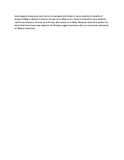| dc.contributor.author | Metselaar, D | |
| dc.contributor.author | Blumberg, BS | |
| dc.contributor.author | Millman, I | |
| dc.contributor.author | Parker, AM | |
| dc.contributor.author | Bagshawe, AF | |
| dc.date.accessioned | 2015-10-01T08:40:48Z | |
| dc.date.available | 2015-10-01T08:40:48Z | |
| dc.date.issued | 1973 | |
| dc.identifier.citation | The Lancet Volume 302, Issue 7832, 6 October 1973, Pages 758–760 | en_US |
| dc.identifier.uri | http://www.sciencedirect.com/science/article/pii/S0140673673910386 | |
| dc.identifier.uri | http://hdl.handle.net/11295/91694 | |
| dc.description.abstract | Aedes aegypti mosquitoes were fed on or inoculated with blood or serum positive for hepatitis-B antigen (HBAg) or allowed to feed on the arm of an HBAg carrier. Pools of mosquitoes were tested by radioimmunoassay at intervals up to 45 days after exposure to HBAg. HBAg was detected long after the blood itself would have been digested. The findings suggest persistence (but not necessarily replication) of HBAg in mosquitoes. | en_US |
| dc.language.iso | en | en_US |
| dc.publisher | University of Nairobi | en_US |
| dc.title | Hepatitis-b antigen in colony mosquitoes | en_US |
| dc.type | Article | en_US |
| dc.type.material | en | en_US |

